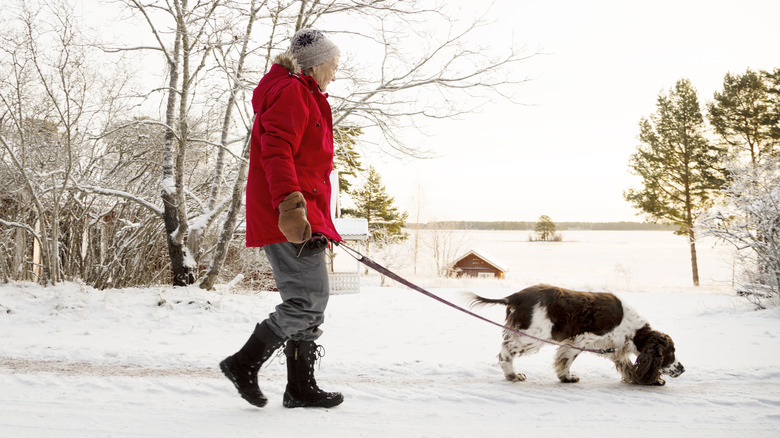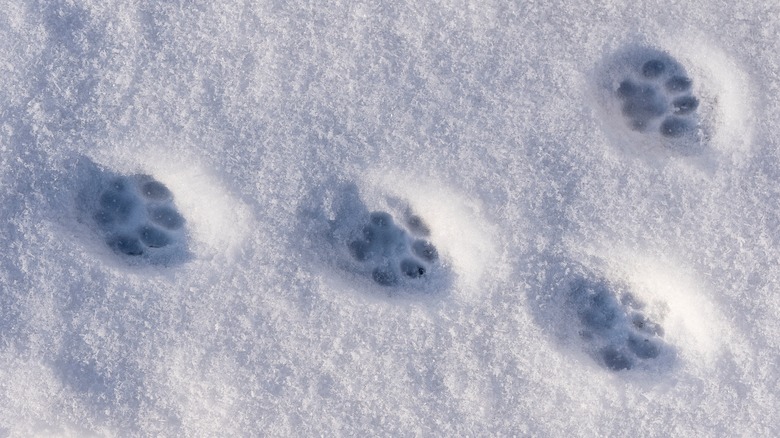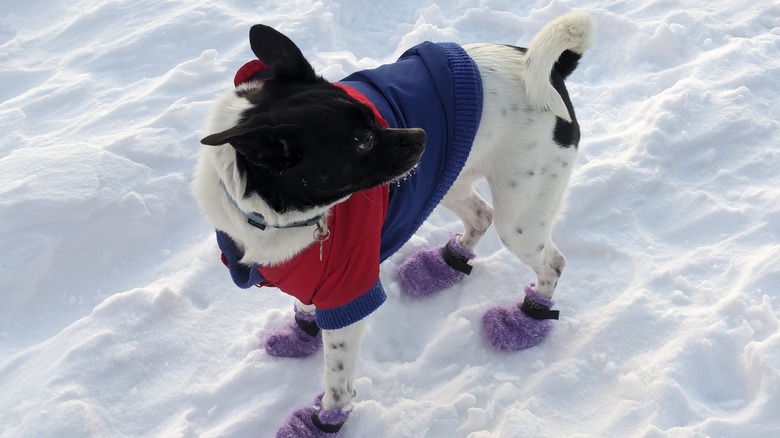Pet Owners Beware: Avoid De-Icers That Contain These Harmful Ingredients
We may receive a commission on purchases made from links.
As winter weather hits, snow, ice, and other sludge can make it hard to get around outdoors safely. Of course, de-icers are commonly used to help increase traction and melt ice on sidewalks and roadways, but these products can also contain ingredients that irritate sensitive pet paws — or worse if ingested.
There are four common types of de-icers: Sodium chloride, or rock salt, is the most popular, but other salt-based de-icers include calcium chloride, potassium chloride, and magnesium chloride. These de-icers can all cause issues if walked on or ingested by pets. How do they consume it? Well, pets trod on the de-icer while outside and then come indoors and lick their paws, which can lead to gastrointestinal upset. Moreover, rock salt can irritate the paws and, if eaten, even lead to severe toxicity. Magnesium chloride can also be harmful if eaten, especially for pets that have renal disease (also known as kidney disease). This is due to the inability of these pets' kidneys to properly filter out magnesium.
Caley Chambers, a doctor of veterinary medicine candidate from the Pet Poison Helpline, told PetMD, "In general, most ice melt exposures are limited to gastrointestinal upset and skin irritation but there is a potential for more serious, life-threatening side effects." Luckily, there are some pet-friendly alternatives available, as well as a few steps you can take at home to keep your pet's paws and tummies safe during wintry weather.
Safer, pet-friendly solutions to traditional de-icers
The easiest way to keep your pet's paws safe from de-icers is to use protection. Doggie winter boots can help protect against the elements and de-icer on the ground. However, cats that venture outdoors may be less interested in wearing booties. Instead, a cat-safe soap can help remove any debris or remaining de-icer from the paws and belly, the latter of which is important because they might have rolled around in it.
Wiping your pet's paws with something such as Wet Ones for Pets is also useful when your pet comes indoors. Another alternative is to protect their feet with paw wax. However, if the wax is particularly tasty, it may accidentally cause your dog or cat to lick their feet and consume some de-icer. Therefore, it's worth testing whether they lick it or not before sending them outside.
While it's important to remember that even pet-safe de-icers can cause issues, it's still a good idea to make sure the de-icer is listed as pet-safe before purchasing it. De-icers containing urea are the least irritating to pets. You also want to avoid de-icers that contain ethylene glycol. This ingredient is also used in antifreeze, and it's highly toxic to pets. Instead, you can opt for items such as cat litter or sand. While they don't melt ice, they can add traction to help prevent slipping.
What to do if you notice paw irritation or your pet consumes de-icer
There are some things you can do to take care of your dog's sore paws, such as cleaning and bandaging them. Keeping the paws clean and dry and taking measures to avoid further de-icer irritation can help. If you're unsure if the de-icer your pet walked on is harmful, contacting the Pet Poison Helpline or ASPCA Poison Control is best.
If your pet ingests a large amount of de-icer or seems to be showing symptoms of toxicity, it's important to seek veterinary care immediately. Toxicity from ingesting de-icer is known as ice-melt toxicity. Symptoms can include drooling, vomiting, and diarrhea in minor cases. However, more severe cases can include severe gastrointestinal upset and electrolyte imbalances such as hypernatremia, or an excessive amount of sodium in the blood. Your vet will likely take some blood work, give an anti-vomiting medication, and even hospitalize your pet depending on the severity of their symptoms.
Luckily, most pets don't experience more than minor paw irritation, as it takes a large amount of de-icer ingestion to cause serious issues. Taking steps to keep your pets safe can help ensure they enjoy winter safely around de-icers.


